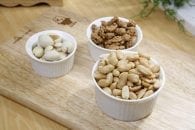Nature packs a lot of nutrition into a little nut, which is why nuts and seeds get honorable mention on our “Top Twelve Foods” list. Nuts are the seeds of different trees. They come in a variety of shapes, flavors, and preparations that add to their appeal: shelled or unshelled, raw, dry roasted, oil roasted, sugared, salted, and honey-coated.
Nuts and seeds are more nutrient-dense than most other foods. They are rich sources of protein, fiber, B-vitamins, folic acid, calcium, iron, zinc, and the antioxidants vitamin E and selenium. Think nuts have too much fat to be part of a healthy diet? Wrong! Nuts do contain a lot of fat, yet ninety percent of this fat is the heart-healthy, unsaturated kind. In fact, recent studies have shown that eating nuts may reduce a person’s risk of having a heart attack. Because nuts and seeds are high in monounsaturated fats, they have been found to lower LDL cholesterol.
Roasted nuts are more flavorful and spoil less quickly, yet how they are roasted makes a big nutritional difference. Dry roasted nuts don’t have any added fat. Oil roasted means the nuts are fried in oil, which adds around ten percent more fat calories to the nuts. This is no big deal unless the nuts have been roasted in saturated or hydrogenated fats (e.g. coconut oil); check the label. An increase in saturated fats lessen the nut’s main nutritional claim to fame – they’re low in saturated fats.
While heating or roasting nuts does enhance the flavor and reduce spoilage, it also may alter some of the essential fatty acids. This is why processed nuts are less likely to go rancid, but the tradeoff may be a loss of healthy nutrients. Seeds and nuts themselves are more nutritious than the oil extracted from them, at least in theory. Seeds and nuts contain natural vitamin E, which protects their oil from going rancid. Processing may remove some of the natural antioxidants in the nuts and seeds.
While nuts and seeds are a perfect snack, don’t go nutty over their nutrition. A handful of nuts or seeds pack around 200 calories. Best to dole out a small amount into a container rather than snacking right out of the bag. The good news is that the fiber in nuts and seeds fills you up quickly, making you less likely to overeat while you’re snacking and at the next meal.
Sunflower and sesame seeds, along with various kinds of nuts, are a nutritious addition to salads. This also makes a small amount of nuts go a long way. Sprinkle on a spoonful and enjoy!
NUTRITIP: Buy Organic
When it comes to nuts, organic is better. All nuts, and peanuts especially, pick up pesticide residues due to their high oil content. Ditto for nutbutters.
Dr. Sears, or Dr. Bill as his “little patients” call him, has been advising busy parents on how to raise healthier families for over 40 years. He received his medical training at Harvard Medical School’s Children’s Hospital in Boston and The Hospital for Sick Children in Toronto, the world’s largest children’s hospital, where he was associate ward chief of the newborn intensive care unit before serving as the chief of pediatrics at Toronto Western Hospital, a teaching hospital of the University of Toronto. He has served as a professor of pediatrics at the University of Toronto, University of South Carolina, University of Southern California School of Medicine, and University of California: Irvine. As a father of 8 children, he coached Little League sports for 20 years, and together with his wife Martha has written more than 40 best-selling books and countless articles on nutrition, parenting, and healthy aging. He serves as a health consultant for magazines, TV, radio and other media, and his AskDrSears.com website is one of the most popular health and parenting sites. Dr. Sears has appeared on over 100 television programs, including 20/20, Good Morning America, Oprah, Today, The View, and Dr. Phil, and was featured on the cover of TIME Magazine in May 2012. He is noted for his science-made-simple-and-fun approach to family health.

